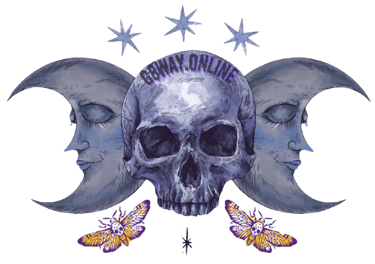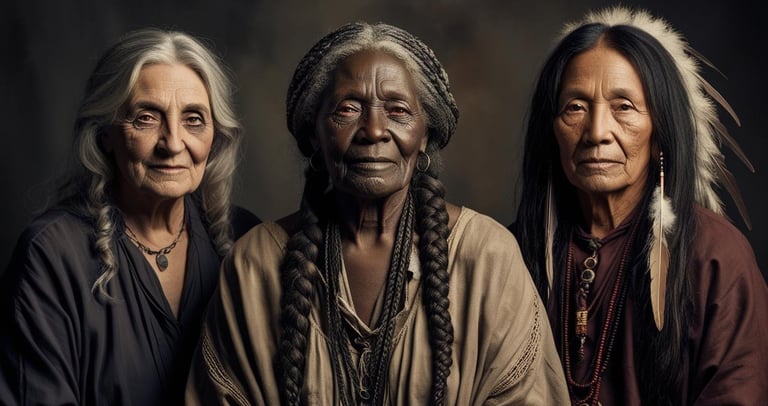Discovering My Occultist Roots Through Ancestry & Afro-Euro Witchcraft
Trying to link ancestry DNA test results to a family tree of many secular origins.
ROOTSOCCUTISTANCESTRYDNA
Lya Brk Ujv
6/5/20254 min read
A Legacy of Belief: From Persecution to Practice
Europe's relationship with witchcraft is long and complex. For centuries, accusations of witchcraft led to brutal persecutions across the continent. Unlike the infamous Salem witch trials in colonial America, which often relied on "spectral evidence"—visions or dreams presented as testimony—the European trials adhered more to the established religious and legal frameworks of that time. They were driven by shifts in power, the need for religious conformity and fear of social upheaval (apparently the go-to destructive behavior has always been prevalent when the populace doesn't know what else to do).
Despite this grim history, Europe has also been the cradle of many esoteric and spiritual traditions that long predate the witch hunts. As society has evolved beyond the paranoia of past centuries, belief in and practice of witchcraft continues to thrive—albeit in transformed and more accepted ways.
Wicca: Reclaiming Ancient Roots
Wicca is the most prominent Neo-Pagan tradition in modern Europe. Emerging in the mid-20th century, it draws from pre-Christian European traditions, ceremonial magic, and folk customs. It celebrates the cycles of nature, the divine feminine and masculine, and the interconnectedness of all life.
Wiccans like to refer to themselves as witches, but their practices are rooted in reverence, healing, and harmony rather than the malevolence once falsely attributed to the term. Rituals, seasonal festivals, and a deep respect for the Earth form the spiritual foundation of Wicca—I can grasp why they're called tree-hugging hippies but hey, it's like that 'Facts o Life' theme song: "you take the good, you take the bad, you take them both & there you have: the facts of life..." All and all still a compelling possibility for those like me seeking a connection to ancestral European beliefs.
A recent ancestry DNA test revealed a surprising insight: I am 58% European. That number, while just a data point to everyone else, sparked a deeper question for me—what cultural and spiritual legacy comes with this heritage? More specifically, I wondered: Do my roots trace back to the mystical and magical occult? In exploring this, I found myself delving into the living traditions of Voodoo, Wicca, and Stregheria — and the modern forms of Euro-Afro witchcraft still practiced today.
As a Bonafide Puerto Rican, my bloodline stretches down to Sub-Saharan & North Africa as well. The motherland of voodoo. That part of the globe has had its share of witch hunts too; in areas like Kenya, for instance, where mass killings of witches occurred because of idiotic people in charge at the time. My whole set up is as follows: 57.6% European, 28.2% African & Indigenous traces came out to be 12.3%. (Research of Indigenous practices did not yield any different intel other than what is already known. Aside from dreamcatchers, peace pipes, rain dancing & Shamans, Indian folk were, for the most part, worshippers of all living things from rocks to buffalo. Not one tribe has ever been attributed to malicious handling of their belief systems). Witchcraft simply does not exist in Indigenous traditions.
About Vodun, bka Voodoo
Vodun encompasses a complex system of beliefs involving a supreme creator divinity, lesser spirits (voduns), and the worship of ancestors. Places like Benin celebrate with an annual "Vodoun Day" (Fête du Vodoun) which is a public holiday. Seriously, every year on January 10th, colorful processions, traditional drumming and dancing, animal sacrifices, and rituals invoking various Vodun spirits by priests, priestesses, and followers dressed in symbolic attire to honor the spirits, ceremonies are held at The Python Temple and the Door of No Return. This is how the celebration ensues. Go figure.
Now for Stregheria: The Italian Path
While Wicca has a broad European influence, Stregheria offers a more specific cultural tie—it is a distinctly Italian form of Neo-Pagan witchcraft. Rooted in the ancient traditions of Italy, Stregheria honors deities like Diana and emphasizes family, nature, and the practice of “La Vecchia Religione” (the Old Religion).
Learning about Stregheria felt like opening a forgotten door in my heritage. Part of my DNA traces back to Sardinia so, perhaps Stregheria, with its emphasis on lineage and lore passed down through generations, could reflect a hidden aspect of my spiritual ancestry. Hmmmm...
Social Forces and Occult Survival
Historically, both the Salem and European witch trials were driven by societal stressors—fear, famine, war, and shifting power dynamics. These events, while tragic, were not merely about superstition but were shaped by real-world tensions. Ironically, these same pressures have also contributed to the resurgence of spiritual exploration today, as people seek meaning and belonging in a fast-changing world. In this context, modern witchcraft is less about spells and more about reconnecting with nature and reclaiming identity, by honoring the past.
Reclaiming a Hidden Heritage
My DNA test didn’t just tell me where I’m from; it prompted me to consider who I might be. Wicca and Stregheria may not have been the exact practices of my ancestors, but they represent a living link to the beliefs, values, and worldviews that shaped them. In rediscovering these traditions, I’m not stepping back into a superstitious past—I’m stepping forward into a more conscious, connected future. One where the old ways still whisper, if we’re willing to listen.
Thank You for Your patronage.
G8WAY intellectual property found herein is branded as such and most graphic interchange formats along with all links lead to external businesses not owned or operated by G8WAY. If you own any image included here and wish to request its removal or proper attribution, please contact admin@g8way.online and G8WAY will respond as promptly as possible. Please note: a page’s presence in G8WAY does not imply it is complete. Each entry is a living document that may be subjected to editorial corrections and/or additions. G8WAY may earn a commission when users make a purchase through links posted throughout this site. Information on WWW.G8WAY.ONLINE is opinionative and for entertainment purposes only and should not be considered professional advice. Thank You for Visiting! G8WAY.ONLINE ©2025 All rights reserved.



